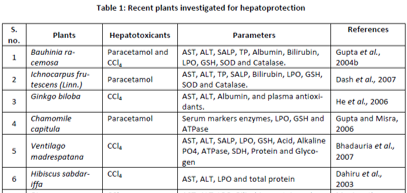Abstract
Liver plays a pivotal role in regulating various physiological processes such as metabolism, secretion and storage. It also plays an important role in removing harmful substances and toxins that enter the body. Liver cell injury caused by various toxic chemicals (Paracetamol, Carbon tetrachloride (CCl4), Alcohol, D-galactosamine, Thioacetamide, etc.), excessive alcohol consumption and microbes are well-studied. The available synthetic drugs to treat liver disorders in this condition also cause further damage in the liver. Hence, Herbal drugs have become increasingly popular and their use is wide-spread. Herbal medicines have been used for the treatment of liver diseases for a long time. A number of herbal preparations are available on the market. The present review is aimed at compiling data on promising from medicinal plants that have been tested in hepatotoxicity models using the modern scientific system. Latest trends have shown increasing demand of phyto drugs and thus India, with its traditional background.
Full text article
Authors

This work is licensed under a Creative Commons Attribution-NonCommercial-NoDerivatives 4.0 International License.

